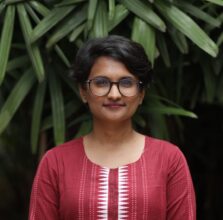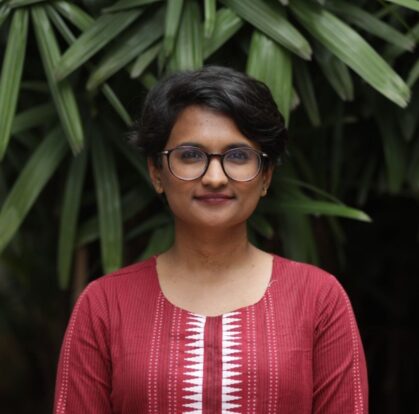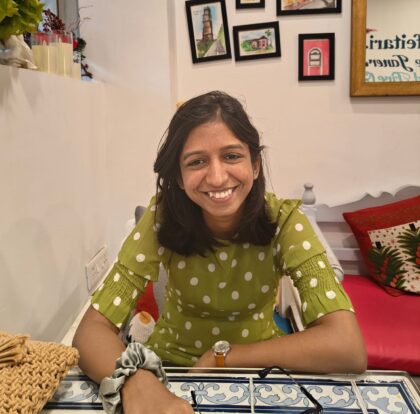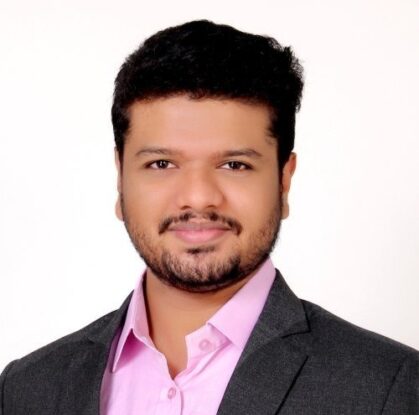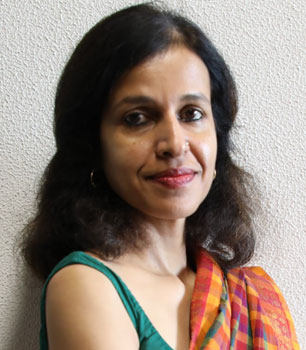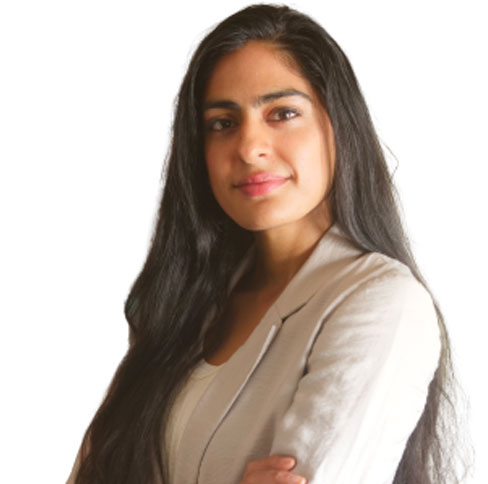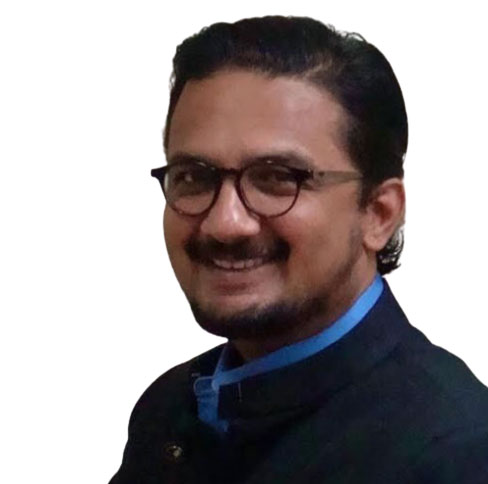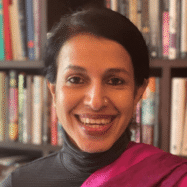
Online classes by faculty on Wednesdays and Saturdays

Hands-on practical sessions, guest lectures and topic-based sessions

Learning journey in two tracks - based on your goals

Online proctored mid-term and end-term exams

Limited scholarships available for deserving candidates
Applications Closed
Data Science for Social Impact - 2025
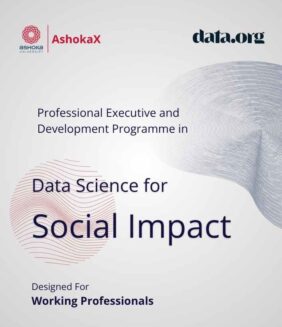
Following the success of our second cohort, we are pleased to announce the launch of the third cohort of the PEDP in Data Science for Social Impact. This pioneering programme seeks to train a group of social impact professionals in the techniques and tools of data science, with a focus on climate change, public health, and their intersection. Ashoka University has developed this programme as one of the founding members of data.org’s India Data Capacity Accelerator (IDCA) initiative.
Hosted on the AshokaX platform and organized by the Centre for Data Sciences and Analytics (CDSA), the program faculty includes Prof Partha Pratim Das and other distinguished experts and practitioners from Ashoka University and other leading institutes and organisations. The programme seeks to train a cohort of data professionals with interdisciplinary subject-matter expertise in climate and health data, with a key focus on Inclusion, Diversity, Equity, and Accessibility (IDEA). Ashoka University is offering a two-track programme this year - 1) Data Science and Analytics for Social Impact and 2) Data Science for Social Impact Management. Upon completion of the programme, the learners will be awarded a Certificate in Data Science for Social Impact with their track mentioned along with the grade.
This programme is designed for professionals in the social impact space, including those working in climate, health, development, policy, and data. Whether you're a data analyst, programme manager, or aspiring data scientist, the PEDP equips you to leverage data for real-world impact.
Programme Structure
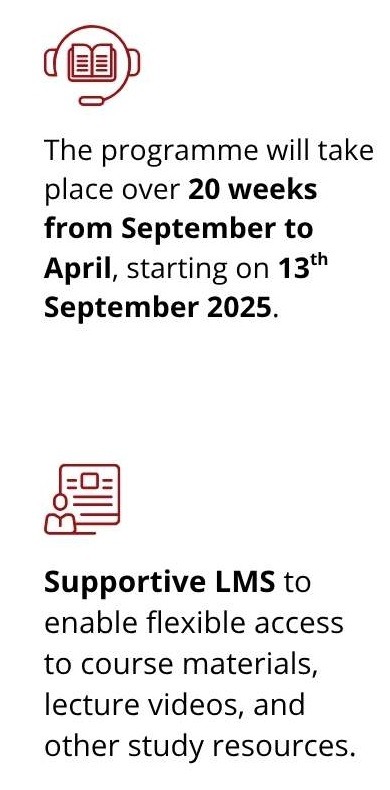
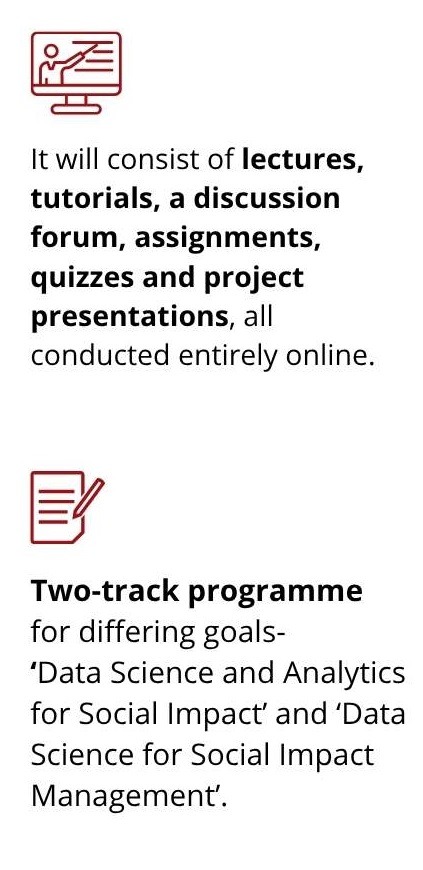
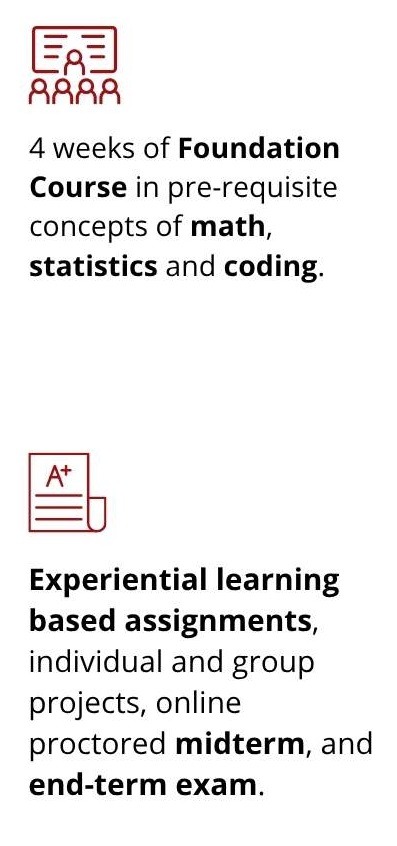
Learning Tracks
We recognize the differing needs among social sector practitioners for data science:
a) Gaining proficiency as a data scientist and coding programs, or
b) Gaining awareness of data science tools and techniques to interpret and make informed decisions

Track 1
Data Science and Analytics for Social Impact:
Focus: Learn to apply data science tools and techniques, including modelling, analysis, and visualization, to solve social impact problems
Who is it for?: Data practitioners, analysts and aspiring data scientists

Track 2
Data Science for Social Impact Management:
Focus: Understand data science principles and practices to effectively manage data-driven social impact projects
Who is it for?: Generalists, program managers and other non-technical roles that need an understanding of data science
Core Programme Faculty from Ashoka University

PARTHA PRATIM DAS
obtained his PhD in 1988. He served as a faculty member in the Department of Computer Science and Engineering, IIT Kharagpur, from 1988 to 1998. He then shifted from academics to industry, initially as a Director for Alumnus Software and as the CEO of a start-up A Quaint Technology before joining Interra Systems as a Senior Director and Centre Head, Kolkata in 2001. His areas of expertise include computer vision, digital learning, digital geometry, and image processing.
Dr Das has been a Visiting Professor with the Institute of Radio Physics and Electronics, University of Calcutta (2003–12), Head of the Rajendra Mishra School of Engineering Entrepreneurship, IIT Kharagpur, (2013–20), Professor-in-Charge for the Research Park, IIT Kharagpur (2017–20), and Joint Principal Investigator at the award-winning National Digital Library of India (NDLI) project of the Ministry of Education (2015-2022).

Gautam Menon
Sector Lead - Climate Science
Dean, Research, Professor of Physics and Biology and Director of Climate Change and Sustainability (3CS)

Gautam Menon
is a Professor of Physics and Biology at Ashoka University. He heads its Centre for Climate Change and Sustainability (3CS) and is currently Dean (Research) at Ashoka University. He was recently appointed a Commissioner on the Lancet Commission on “Strengthening the use of Epidemiological Modelling”.
He completed a BSc (Hons) in physics at St. Stephens College, Delhi, an MSc from IIT Kanpur, and a Ph.D from the Indian Institute of Science, Bangalore. He serves on the scientific review committees of several international and national agencies, including the Human Frontier Science Program and the Wellcome Trust-DBT India Alliance, as well as on a number of national committees.

Anurag Agrawal
Sector Lead - Health Science
Dean of Bio-Sciences and Health Research at the Trivedi School of Biosciences

Anurag Agrawal
is Dean, BioSciences and Health Research, Trivedi School of Biosciences, Ashoka University, India, and former director of the Institute of Genomics and Integrative Biology, a national laboratory of CSIR, India. After completing graduate medical education at the All India Institute of Medical Sciences, Delhi, he further trained in Internal Medicine, Pulmonary Disease and Critical Care at Baylor College of Medicine, Houston, USA, followed by a PhD in Physiology from Delhi University.
His primary research is in respiratory biology and broader interests are in a new vision of health and healthcare seen through the lenses of emerging technologies. He serves on numerous national and global advisory groups, most recently chairing the World Health Organization technical advisory group for viral evolution. He received the Shanti Swaroop Bhatnagar Prize in 2014, the Sun Pharma Foundation award in 2020, and is a fellow of the Indian national science academies.
Programme Faculty & Advisors
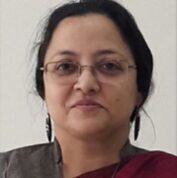
Lipika
Dey
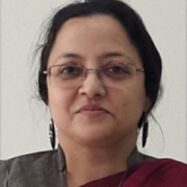
Lipika Dey
Professor of Computer Science at Ashoka University
Lipika is a Professor of Computer Science. She was earlier a Chief Scientist at Tata Consultancy Services (TCS), Research, where she was heading research on the theme of Economic and Financial Intelligence. Her research interests are in the areas of Artificial Intelligence, Natural Language Processing and Data Analytics. She has a keen interest in the fields of healthcare and sustainability analytics. Prior to joining TCS, Lipika was a member of the faculty at the Department of Mathematics, IIT Delhi. Lipika was elected to the Fellowship of the Indian National Academy of Engineering in 2021. She was also awarded the Distinguished Scientist award by TCS in 2012.
Lipika has a PhD in Computer Science and Engineering from IIT Kharagpur, where she had also done her graduation and post-graduation in Mathematics and Computer Science. As a member of the Association for Computing Machinery (ACM), the world’s largest educational and scientific computing society engaged in the advancement of computing as a science and a profession, Lipika is actively involved in mentorship programs for PhD scholars and activities to promote Women in STEM.
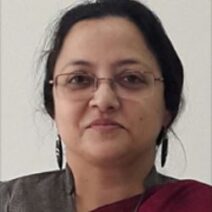
Lipika Dey
Professor of Computer Science at Ashoka University
Lipika is a Professor of Computer Science. She was earlier a Chief Scientist at Tata Consultancy Services (TCS), Research, where she was heading research on the theme of Economic and Financial Intelligence. Her research interests are in the areas of Artificial Intelligence, Natural Language Processing and Data Analytics. She has a keen interest in the fields of healthcare and sustainability analytics. Prior to joining TCS, Lipika was a member of the faculty at the Department of Mathematics, IIT Delhi. Lipika was elected to the Fellowship of the Indian National Academy of Engineering in 2021. She was also awarded the Distinguished Scientist award by TCS in 2012.
Lipika has a PhD in Computer Science and Engineering from IIT Kharagpur, where she had also done her graduation and post-graduation in Mathematics and Computer Science. As a member of the Association for Computing Machinery (ACM), the world’s largest educational and scientific computing society engaged in the advancement of computing as a science and a profession, Lipika is actively involved in mentorship programs for PhD scholars and activities to promote Women in STEM.

Subhashis
Banerjee

Subhashis Banerjee
Head of the Department & Professor of Computer Science, Ashoka University
Subhashis was with the Department of Computer Science and Engineering at IIT Delhi from 1990 till August 2023. From June 2021 to May 2023 he was at the Ashoka University on leave from IITD. At IITD he has held the Ministry of Urban Development, Microsoft and Naren Gupta chair professorships. He was the head of the department of computer science at IIT Delhi between 2004-2007 and head of the computer services centre between 2009-2014. Subhashis is also associated with the School of Public Policy and the Centre for Transportation Research and Injury Prevention at IIT Delhi.
Subhashis’ primary areas of research are computer vision and machine learning, with a special emphasis on geometric algorithms. He has been on the editorial boards of the International Journal of Computer Vision and Computers and Graphics, and has published in leading journals and conferences. He has also worked extensively on design of computing and networking infrastructure and IT services and in developing the supercomputing infrastructure at IIT Delhi, which is one of the largest in the country. He has been an academic visitor to several universities and research laboratories all over the world.
Recently he has also developed an interest in policy issues digitalisation and society, including digital identity, electronic voting, data and privacy protection, and fairness and reliability of machine learning algorithms.
Subhashis graduated in electrical Engineering from Jadavpur University in 1982 and did his Master’s and PhD from the Indian Institute of Science in 1984 and 1989 respectively.

Subhashis Banerjee
Head of the Department & Professor of Computer Science, Ashoka University
Subhashis was with the Department of Computer Science and Engineering at IIT Delhi from 1990 till August 2023. From June 2021 to May 2023 he was at the Ashoka University on leave from IITD. At IITD he has held the Ministry of Urban Development, Microsoft and Naren Gupta chair professorships. He was the head of the department of computer science at IIT Delhi between 2004-2007 and head of the computer services centre between 2009-2014. Subhashis is also associated with the School of Public Policy and the Centre for Transportation Research and Injury Prevention at IIT Delhi.
Subhashis’ primary areas of research are computer vision and machine learning, with a special emphasis on geometric algorithms. He has been on the editorial boards of the International Journal of Computer Vision and Computers and Graphics, and has published in leading journals and conferences.
Subhashis graduated in electrical Engineering from Jadavpur University in 1982 and did his Master’s and PhD from the Indian Institute of Science in 1984 and 1989 respectively.
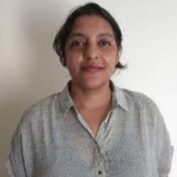
Meghna
Agarwala

Meghna Agarwala
Assistant Professor of Environmental Studies at Ashoka University
Meghna is an Assistant Professor of Environmental Studies at Ashoka University. She received her PhD in Ecology, Evolution and Environmental Biology from Columbia University, and an MS from Yale School of Forestry and Environmental Studies. Prior to joining Ashoka University, she was a postdoctoral research scientist at Earth Institute, Columbia University, and Centre for International Forestry Research (CIFOR), Bogor, Indonesia.
Her current projects focus on long-term impacts of climate change on forest dynamics, ecosystem services of plantations, and human-elephant conflict. Her current work is funded by SERB and Swedish Research Council and is located in Odisha, Madhya Pradesh, Himachal Pradesh and Nepal. She also consults for geo-spatial and forestry projects.
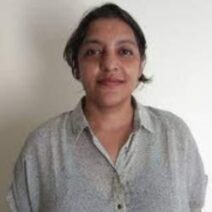
Meghna Agarwala
Assistant Professor of Environmental Studies at Ashoka University
Meghna is an Assistant Professor of Environmental Studies at Ashoka University. She received her PhD in Ecology, Evolution and Environmental Biology from Columbia University, and an MS from Yale School of Forestry and Environmental Studies. Prior to joining Ashoka University, she was a postdoctoral research scientist at Earth Institute, Columbia University, and Centre for International Forestry Research (CIFOR), Bogor, Indonesia.
Her current projects focus on long-term impacts of climate change on forest dynamics, ecosystem services of plantations, and human-elephant conflict. Her current work is funded by SERB and Swedish Research Council and is located in Odisha, Madhya Pradesh, Himachal Pradesh and Nepal. She also consults for geo-spatial and forestry projects.

Sandeep
Sukumaran
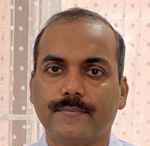
Sandeep Sukumaran
Assistant Professor at CAS, IIT-Delhi
Sandeep did M.Sc. in meteorology from the Cochin University of Science and Technology in 2004 and obtained a PhD from the Department of Physics & Meteorology, IIT Kharagpur, in 2009. He held postdoctoral stints at the University of Oslo, Norway and New York University Abudhabi before joining IIT Delhi in 2017.
Sandeep’s research interests are in understanding the dynamics of the Indian summer monsoon, changes in monsoon in a warming climate, and applications of AI/ML in atmospheric sciences.
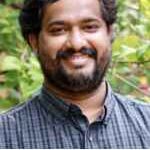
Sajeev
Philip
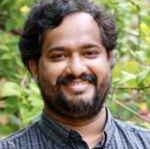
Sajeev Philip
Assistant Professor at CAS, IIT-Delhi
Sajeev Philip joined as an Assistant Professor at CAS, IIT-Delhi in November 2021. Before joining CAS, he was a visiting associate scientist at NASA Academic Mission Services by Universities Space Research Association at NASA Ames Research Center (2019-2021). Sajeev started at NASA Ames Research Center as a NASA Postdoctoral Program (NPP) fellow (2016-2019). He received his PhD in Physics from Dalhousie University in Canada (2015), and his MSc in Physics (2007) and BSc in Physics (2005) from the University of Kerala.
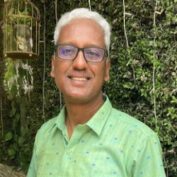
Venkatesh
Rajamanickam

Venkatesh Rajamanickam
Professor of Industrial Design Centre at IIT Mumbai
Venkatesh is a Professor at the IDC School of Design, IIT Bombay. He is a HCI designer, educator and researcher. His Information Design Lab at IIT Bombay utilizes graphic design, interactive computer graphics, data-processing algorithms and emerging technologies to address challenging problems in data, design and art. His research focuses on data-based and visual understanding of a range of issues from public understanding of science, urban living, politics, education, transportation, to generative art.
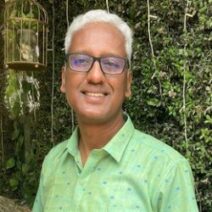
Venkatesh Rajamanickam
Professor of Industrial Design Centre at IIT Mumbai
Venkatesh is a Professor at the IDC School of Design, IIT Bombay. He is a HCI designer, educator and researcher. His Information Design Lab at IIT Bombay utilizes graphic design, interactive computer graphics, data-processing algorithms and emerging technologies to address challenging problems in data, design and art. His research focuses on data-based and visual understanding of a range of issues from public understanding of science, urban living, politics, education, transportation, to generative art.

Ramachandran Thiruvengadam

Venkatesh Rajamanickam
Assistant Professor (Biochemistry), Pondicherry Institute of Medical Sciences
Ram is a resident of Pondicherry, India. He's a pediatrician-scientist, and researches in the domain of maternal-child health. He graduated from Madras Medical College, Chennai and All India Institute of Medical Sciences, New Delhi. He’s currently on the faculty at Pondicherry Institute of Medical Sciences, Puducherry, India, and an Investigator in the Interdisciplinary Group for Advanced Research on Birth Outcomes – DBT India Initiative (GARBH-Ini).
His specific interest is in perinatal epidemiology to identify causal risk factors of preterm birth and fetal growth restriction, to be able to design effective interventions to prevent them. Trained as a translational researcher, he works extensively on the development and validation of clinical prediction models for birth outcomes. He has extensive experience in scientific and technical writing, and regularly publishes scholarly articles in peer-reviewed scientific journals.
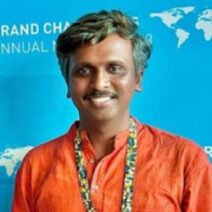
Ramachandran Thiruvengadam
Assistant Professor (Biochemistry), Pondicherry Institute of Medical Sciences
Ram is a resident of Pondicherry, India. He's a pediatrician-scientist, and researches in the domain of maternal-child health. He graduated from Madras Medical College, Chennai and All India Institute of Medical Sciences, New Delhi. He’s currently on the faculty at Pondicherry Institute of Medical Sciences, Puducherry, India, and an Investigator in the Interdisciplinary Group for Advanced Research on Birth Outcomes – DBT India Initiative (GARBH-Ini).
His specific interest is in perinatal epidemiology to identify causal risk factors of preterm birth and fetal growth restriction, to be able to design effective interventions to prevent them. Trained as a translational researcher, he works extensively on the development and validation of clinical prediction models for birth outcomes. He has extensive experience in scientific and technical writing, and regularly publishes scholarly articles in peer-reviewed scientific journals.
A Transformative Learning Experience
My learning experience was excellent, and the program exceeded my expectations. The modules that intrigued me the most were ML, GIS, and visualization.
- Dipti Singhania
This was one of the most engaging virtual course I have ever taken. Though it was virtual, the instructors made it a point to make sure everyone attending were engaging and were on the same page.
- Vinoj Raj
I discovered new methods of data analysis using satellite and GIS data, and learned about various ML classification models. Despite the short duration, the course provided clear directions and focus areas for the future. Sessions with industry experts were particularly insightful, offering a glimpse into current industry practices.
- Saiyeed Mashkur Al Hakim
Want to know more?
Read the programme FAQs or reach out to our team who will be happy to answer any questions you might have or help you with the enrollment process.
Write to us at certificates@x.ashoka.edu.in or call us at +91 7497099940
A Transformative Learning Experience
Watch: What our Past Learner Has to Say
I gained a solid understanding of the data science workflow, including data acquisition, cleaning, exploration, analysis, modeling, and communication of results.
- Chandanapriya Dhanraj
My learning experience was excellent, and the program exceeded my expectations. The modules that intrigued me the most were ML, GIS, and visualization.
- Dipti Singhania
Who is this programme for?
This programme is designed for professionals in the social impact space, including those working in climate, health, development, policy, and data. Whether you're a data analyst, programme manager, or aspiring data scientist, the PEDP equips you to leverage data for real-world impact.
Do I need a technical background to join?
The programme offers two tracks: one for technical learners (data science and analytics) and another for non-technical professionals (impact and program management). A foundation module covers basic-level math, coding, and statistics for all participants.
What will I learn in this programme?
You'll learn how to collect, clean, analyse, and visualise data. You'll gain hands-on experience with tools like spreadsheets, geospatial analysis, and basic machine learning. You'll also work on real-world case studies in climate change and public health. Most importantly, you'll learn to use data in a way that's ethical, meaningful, and focused on creating real impact.
How is the programme structured?
It's a 20-week live online programme with live classes twice a week, hands-on projects, assignments, and discussion/lab sessions.
What is the schedule?
Classes are on Wednesdays (6-8 PM) and Saturdays (10 AM-12 PM). Discussion/Lab sessions will also be conducted on Saturdays. Timings for this will be confirmed later.
Will I get a certificate?
Yes. Upon successful completion, you will receive a Certificate in Data Science for Social Impact from Ashoka University. Your chosen track (Analytics or Management) will be mentioned on the certificate.
What is the course fee?
The programme is priced at INR 1,20,000 per learner.
Are scholarships available?
Yes. Limited scholarships are available for deserving learners on a first-come, first-served basis.
Can I join if I work full-time?
Yes, the programme is specifically designed for working professionals interested in Data Science. Live sessions are scheduled on weekday evenings and weekends, with recorded materials available as needed.
Who do I contact for more information?
For any questions, reach out to the AshokaX team at certificates@x.ashoka.edu.in or call us at +91 7497099940
Partners




